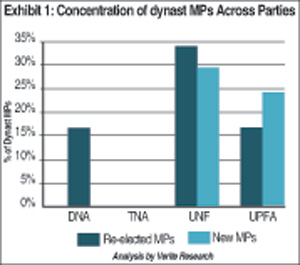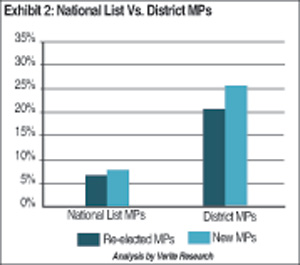News
Keeping it within the family, turning the House into an heirloom
What enables a politician to get elected, and how important is it that he comes from a dynastic family: that is, where an immediate family member or close relative is already in political office at the national or provincial/local level? Analysis by Manthri.lk, a pioneering online platform that monitors and ranks all the proceedings and actors in Parliament, shows that dynastic influence maybe increasing in Sri Lanka’s Parliament. Twenty per cent of Sri Lanka’s parliamentarians are connected to a political family.
 New MPs are more dynastic- it’s growing: At least 20% of parliamentarians benefit from dynastic influence. But more from among new MPs (those who have entered Parliament for the first time in 2010). Amongst new MPs it is 23%, and among those re-elected it is only 18%.
New MPs are more dynastic- it’s growing: At least 20% of parliamentarians benefit from dynastic influence. But more from among new MPs (those who have entered Parliament for the first time in 2010). Amongst new MPs it is 23%, and among those re-elected it is only 18%.
UNF the most dynastic, but UPFA is driving the increase: The UNF has the highest proportion of dynastic MPs, both re-elected (33%) and new (28%) – but as the numbers show, it is decreasing. The increase is being driven by the UPFA which has only 16% amongst the re-elected, but over 23% of the new MPs in the UPFA benefit from dynastic influence (Exhibit 1).
 The DNA has seen the most change in the MPs newly elected in the last election. While 16.7% of their re-elected MPs are dynasts, none of the new MPs are dynasts.
The DNA has seen the most change in the MPs newly elected in the last election. While 16.7% of their re-elected MPs are dynasts, none of the new MPs are dynasts.
National List helps to reduce dynastic influence: Among the new National List MPs, only about 8% have dynastic influence. But amongst the new district list MPs it more than triples to 26% (Exhibit 2).
Is this increase of MPs benefiting from dynastic influence a sign of things to come in the future? What bearing does it have on parliamentary democracy? Share your thoughts with us at www.manthri.lk/en/blog; or by text to the manthri.lk hotline: 071-4639882.

